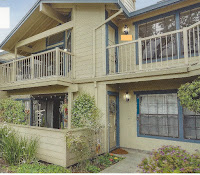 |
| The unit is on the 2nd floor. |
We are already seeing early signs of a recession with layoffs in tech and a cooling housing market (mortgage interest rates have risen above 5%).Saturday's mail included a flyer for a new listing in a nearby development.
A two-bedroom, two-bath condo has been offered at $829,000 (pictures right) when one year ago similar units had sold for over $1 million.
But could a mortgage-rate change by itself explain a $200,000 drop in price? Yes.
The table below compares the monthly payment on a $1.02 million property versus one that costs $800,000. Both are financed with an 80% 30-year loan, the former at 3% and the latter at 5%.
The 20% down payment is $44,000 ($204,000-$160,000) less on the lower-priced example, but the focus of this exercise is the monthly payment.
(Of course, in real life a $44,000 down payment difference can be a huge factor.)
There's less than a $5 difference in the mortgage payments, confirming the effect that interest rates have on the size of mortgage loans and ultimately real estate prices.
The drop in house prices will be felt immediately after existing "loan-lock" commitments expire, and the ripple effects through construction, labor and the building materials supply chain should manifest before year end.
The coming slowdown in real estate is obvious, while the ultimate recessionary effect on the economy is unclear. Let's hope that the battle against inflation succeeds, else the cost will not have been worthwhile.
Note: below is a chart from the St. Louis Fed. It shows that mortgage rates have risen from 3.0% to 5.2% during the past year.



No comments:
Post a Comment